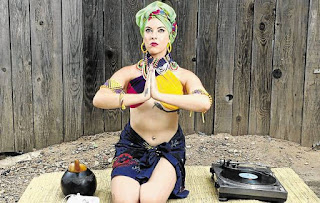The 26-year-old Johannesburg-based DJ has been lambasted online for appropriating black culture. But hold on: who owns the culture? I know of quite a few black people who appear to be European more than they do African. They do not do the black thing for some reason. But that is the way things are. They have the right to adopt the lifestyles they have chosen and remain just as African as the next black South African.
That is diversity in action: being
black or white is not as unambiguous as we would like to imagine it is,
especially when Eminem is the highest-selling rapper of all time and arguably
the best lyricist of his generation. Before Eminem – The Beastie Boys – a New
York-based rap group released "Licensed To Ill" in 1986. It remains
one of the best selling and highly-acclaimed hip-hop albums of all time. And
before the Beastie Boys shook the world of hip-hop: Elvis Presley became one of
the greatest entertainers of all time singing what everyone regarded as black
music.
So
should apartheid-like rules or associations govern the entertainment industry
in South Africa today? No way. Kasi Mlungu deserves her ghetto pass. Much in
the same fashion a black DJ gets a pass in the northern suburbs. Take DJ Fresh
or Euphonik for example. They are black and proud I assume. But nothing about
them screams I-am-black or I-am-all-ghetto.
Put DJ Fresh next to Tiesto,
Skrillex or David Guetta at the next Ultra Music Festival and he will look just
as funky and European they do. It would not be fair of us to ask DJ Fresh to
drop his look because he does not dress like a traditional Tswana man or plead
with Euphonik to find a new stylist so he can look all ghetto-fabulous. If Kasi
Mlungu enjoys spending her weekends in Tembisa and that is her thing: who has
the right to say she cannot base her career on a typically black or township
vibe?
The
African way of life is hardly an innate fact: it is acquired through
observation, experience and education. Lest we forget: this is the year 2017.
And multiculturalism is the reason why pop music is the biggest genre in the
world. It further explains why Michael Jackson is regarded as the greatest
entertainer of all time. Jackson blended a multiplicity of musical styles
borrowed from rock and jazz to rhythm and blues and pop to create a universal
sound that enthralled fans of all races from across the world.
Kasi Mlungu has
discovered her niche beyond the limitations of her Afrikaner upbringing and
that is not a bad thing at all. Compared to three Rondebosch High School Boys
who recorded a song about how much they hate black people Kasi Mlungu may just
be the personification of the vaunted South African dream. Should
we frown upon Kasi Mlungu when the whole world is berating President Donald
Trump for championing what appears to be a white supremacist agenda in America?
Life can get very complicated if everything runs along racial lines and South
Africans begin to value black exclusivity above racial harmony. Can we all
restrict ourselves to liking black clothes, black women and black hairstyles or
favouring black movies, black music and black personalities alone? Would I be
selling out if I listened to Taylor Swift and Maroon 5 all day long? Or would I
be accused of trying to be a white yuppy if I dressed like Adam Levine does?
And if I watched a movie like Forest Gump and cried at the end of it: would I
be faking it and acting un-African?
And should South Africans see every little thing in showbiz through race-tinted eyes now that Kasi Mlungu has chosen to be colourblind? South Africa has a simple choice to make: on the left there are people of different races who are like Penny Sparrow of the black people are 'monkeys' fame. On the right there is Kasi Mlungu who is making the most

No comments:
Post a Comment
Note: only a member of this blog may post a comment.